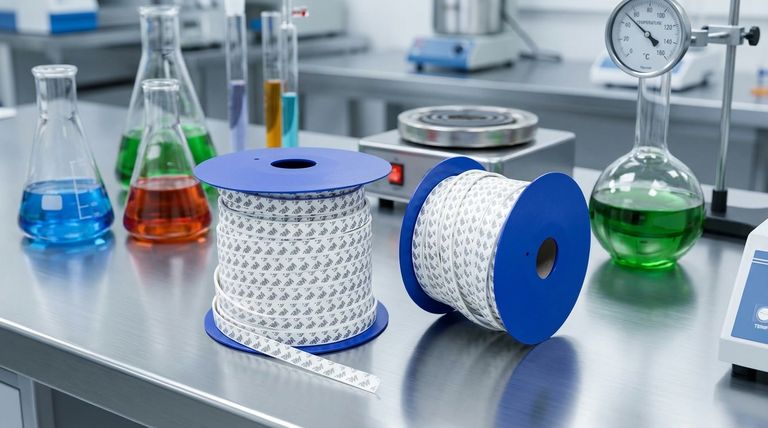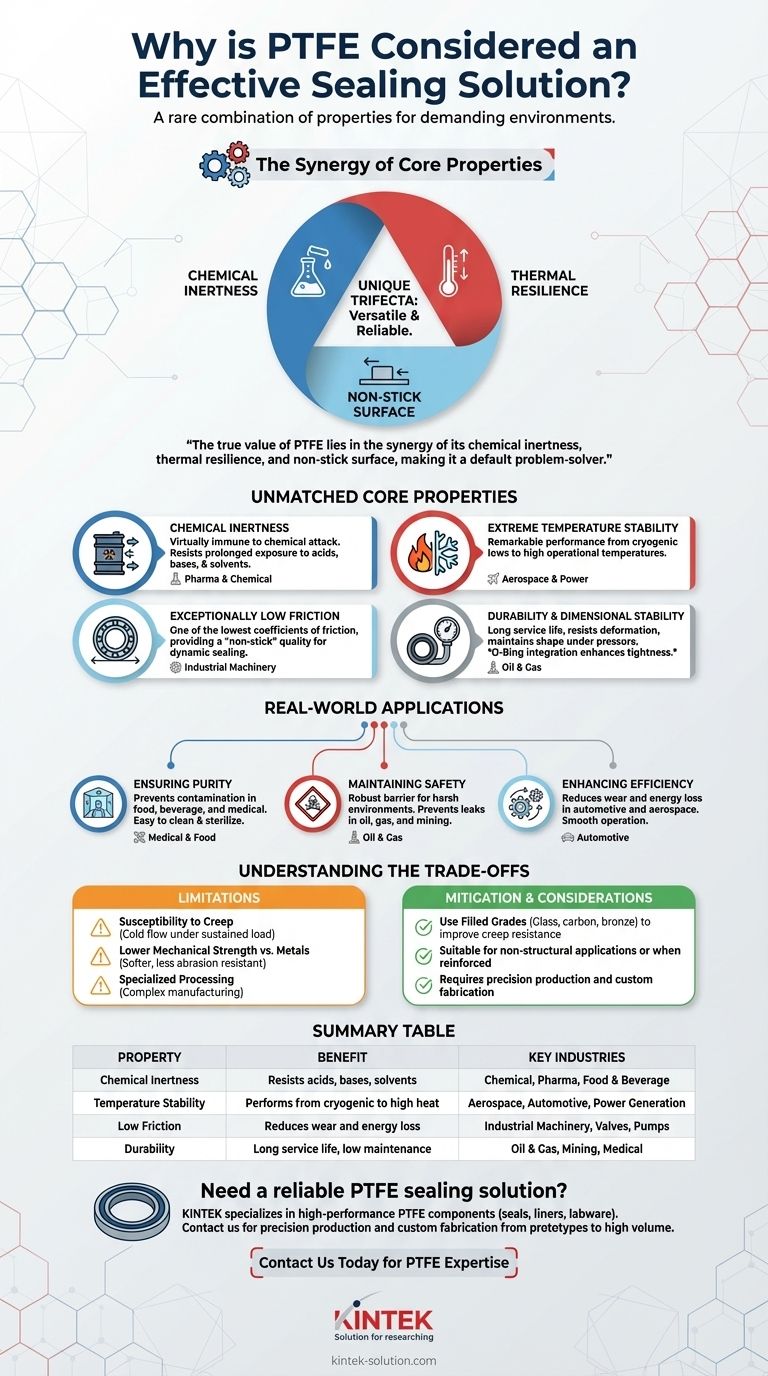At its core, Polytetrafluoroethylene (PTFE) is an effective sealing solution because of its rare combination of properties. It is exceptionally resistant to nearly all industrial chemicals, remains stable across an enormous range of temperatures, and has an extremely low coefficient of friction. This unique trifecta makes it a uniquely versatile and reliable material for creating tight, durable seals in the most demanding environments.
The true value of PTFE lies not in a single characteristic, but in the synergy of its chemical inertness, thermal resilience, and non-stick surface. This combination makes it a default problem-solver for complex sealing challenges where other materials would quickly fail.

The Core Properties of an Elite Sealing Material
To understand why PTFE is so widely trusted, we must first examine the fundamental properties that set it apart from other polymers and sealing materials.
Unmatched Chemical Inertness
PTFE is virtually immune to chemical attack. It can withstand prolonged exposure to aggressive acids, bases, and organic solvents without degrading or losing its structural integrity.
This makes it indispensable in industries like chemical processing and pharmaceuticals, where seal failure due to corrosion could be catastrophic.
Extreme Temperature Stability
This material demonstrates remarkable performance in both high-heat and cryogenic applications. It retains its key mechanical properties, such as strength and dimensional stability, from frigid lows to high operational temperatures.
This thermal resilience ensures a reliable seal in environments like power generation plants, automotive engines, and aerospace systems.
Exceptionally Low Friction
PTFE has one of the lowest coefficients of friction of any solid material, giving it a "non-stick" quality. In dynamic sealing applications, such as in valves or rotating shafts, this property is critical.
A low-friction surface reduces wear on moving parts, lowers the energy required for operation, and prevents the seal from adhering to other components.
Durability and Dimensional Stability
High-quality PTFE seals are known for their long service life and low maintenance requirements. The material resists deformation under pressure and maintains its shape over time.
In some designs, an O-Ring is incorporated as an internal component to enhance tightness and prevent leakage, further improving the seal's long-term performance.
How These Properties Translate to Real-World Applications
The theoretical benefits of PTFE become clear when applied to solve specific industrial problems across various sectors.
Ensuring Purity in Sensitive Industries
In food, beverage, and medical applications, preventing contamination is the highest priority. PTFE's chemical inertness and non-adhesive surface ensure that nothing leaches into the product and that the seal itself is easy to clean and sterilize.
This is why PTFE is commonly used for gaskets, valve seats, and washers in these highly regulated fields.
Maintaining Safety in Harsh Environments
For the oil and gas, chemical processing, and mining industries, a failed seal can lead to dangerous leaks. PTFE's resistance to corrosive chemicals and extreme temperatures provides a robust barrier that maintains sealing integrity under aggressive operating conditions.
Expanded PTFE gaskets, in particular, are valued for their flexibility and superior sealing performance in these environments.
Enhancing Mechanical Efficiency
In automotive, aerospace, and industrial machinery, efficiency is key. PTFE's low-friction properties are used in washers and bearings to reduce wear and energy loss between moving parts.
Its reliability ensures that components like ball valves operate smoothly and consistently over millions of cycles with minimal maintenance.
Understanding the Trade-offs of PTFE
While incredibly capable, PTFE is not without its limitations. An objective evaluation requires acknowledging its trade-offs.
Susceptibility to Creep
Under high, sustained mechanical loads, "virgin" or unfilled PTFE can be prone to cold flow, or creep, where the material slowly deforms over time. This can compromise the sealing pressure.
This is often mitigated by using filled grades of PTFE, where materials like glass, carbon, or bronze are added to improve creep resistance and mechanical strength.
Lower Mechanical Strength vs. Metals
As a polymer, PTFE is inherently softer and has lower tensile strength and abrasion resistance compared to metals. It is not suitable for applications requiring extreme structural rigidity or hardness unless it is reinforced.
Specialized Processing
Manufacturing high-performance PTFE components often requires specialized molding and sintering processes. This can make it more complex to fabricate compared to other common plastics or elastomers.
Making the Right Choice for Your Sealing Goal
Selecting a sealing material depends entirely on the primary demands of your application. PTFE's unique profile makes it the clear choice for specific challenges.
- If your primary focus is chemical purity and safety: PTFE's inertness and non-stick surface make it the ideal choice for food, pharmaceutical, and medical applications.
- If your primary focus is reliability in extreme temperatures: Its stability from cryogenic lows to high heat is unmatched by most polymers, making it perfect for aerospace or power generation.
- If your primary focus is mechanical efficiency and low wear: Its incredibly low friction protects moving parts and reduces energy loss in valves, pumps, and machinery.
Ultimately, PTFE has earned its reputation as an essential sealing material by consistently solving the most difficult engineering challenges across industries.
Summary Table:
| Property | Benefit | Key Industries |
|---|---|---|
| Chemical Inertness | Resists acids, bases, solvents | Chemical, Pharma, Food & Beverage |
| Temperature Stability | Performs from cryogenic to high heat | Aerospace, Automotive, Power Generation |
| Low Friction | Reduces wear and energy loss | Industrial Machinery, Valves, Pumps |
| Durability | Long service life, low maintenance | Oil & Gas, Mining, Medical |
Need a reliable PTFE sealing solution tailored to your industry's demands? At KINTEK, we specialize in manufacturing high-performance PTFE components—including custom seals, liners, and labware—for semiconductor, medical, laboratory, and industrial applications. Our precision production and custom fabrication services ensure your seals meet exact specifications, from prototypes to high-volume orders. Contact us today to discuss how our PTFE expertise can enhance your product's safety, efficiency, and longevity!
Visual Guide

Related Products
- Custom PTFE Parts Manufacturer for Teflon Containers and Components
- Custom PTFE Sealing Tapes for Industrial and High Tech Applications
- Custom PTFE Parts Manufacturer for Teflon Parts and PTFE Tweezers
- Custom PTFE Sleeves and Hollow Rods for Advanced Applications
- Custom PTFE Teflon Balls for Advanced Industrial Applications
People Also Ask
- Why is filled-PTFE often chosen for rotary shaft seal lips? For Unmatched Performance in Extreme Conditions
- Why should negative pressure be avoided with PTFE lined butterfly valves? Prevent Catastrophic Liner Failure
- What additional properties do PTFE O-rings require besides thermal resistance? Master Chemical and Mechanical Sealing
- What makes ePTFE gaskets effective against gas leakage? The Key to Superior Gas Sealing
- What type of gasket is particularly suitable for industries dealing with hazardous chemicals? The Definitive Choice for Safety
- How is Teflon used in thermal breaks in construction? Enhance Building Energy Efficiency with PTFE
- What are machined PTFE parts made of? The Power of Pure Carbon and Fluorine
- What is the primary filler used in PTFE-based materials and why? A Guide to Choosing the Right Reinforcement



















